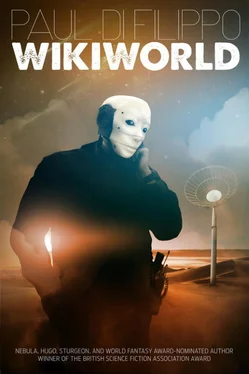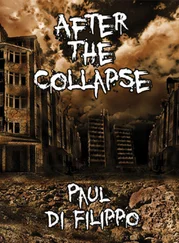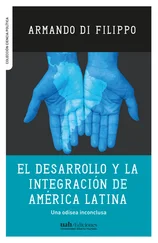Paul Di Filippo - WikiWorld
Здесь есть возможность читать онлайн «Paul Di Filippo - WikiWorld» весь текст электронной книги совершенно бесплатно (целиком полную версию без сокращений). В некоторых случаях можно слушать аудио, скачать через торрент в формате fb2 и присутствует краткое содержание. Город: Toronto, Год выпуска: 2013, ISBN: 2013, Издательство: ChiZine Publications, Жанр: Фантастика и фэнтези, на английском языке. Описание произведения, (предисловие) а так же отзывы посетителей доступны на портале библиотеки ЛибКат.
- Название:WikiWorld
- Автор:
- Издательство:ChiZine Publications
- Жанр:
- Год:2013
- Город:Toronto
- ISBN:978-1771481557
- Рейтинг книги:4 / 5. Голосов: 1
-
Избранное:Добавить в избранное
- Отзывы:
-
Ваша оценка:
- 80
- 1
- 2
- 3
- 4
- 5
WikiWorld: краткое содержание, описание и аннотация
Предлагаем к чтению аннотацию, описание, краткое содержание или предисловие (зависит от того, что написал сам автор книги «WikiWorld»). Если вы не нашли необходимую информацию о книге — напишите в комментариях, мы постараемся отыскать её.
WikiWorld — читать онлайн бесплатно полную книгу (весь текст) целиком
Ниже представлен текст книги, разбитый по страницам. Система сохранения места последней прочитанной страницы, позволяет с удобством читать онлайн бесплатно книгу «WikiWorld», без необходимости каждый раз заново искать на чём Вы остановились. Поставьте закладку, и сможете в любой момент перейти на страницу, на которой закончили чтение.
Интервал:
Закладка:
Mid-October in Carrollboro: sunlight sharp as honed ice-skate blades, big irregularly gusting winds off Lake Ondiara, one of the five Grands. Sidewalks host to generally maintaining citizens, everyday contentment or focus evident, yet both attitudes tempered with the global stresses of the Big Retreat, ultimate source of Tug’s own malaise. (And yet, despite his unease, Tug invariably spared enough attention to appraise all the beautiful women—and they were all beautiful—fashionably bundled up just enough to tease at what was beneath.)
Normally Tug enjoyed the autumn season for its crisp air and sense of annual climax, prelude to all the big holidays. Samhain, Thanksgiving, the long festive stretch that began with Roger Williams’s birthday on December 21 stand extended through Christmas and La Fête des Rois….
But this year those nostalgia-inducing attractions paled, against the harsh background of his struggle to survive.
Patrician merged with Tinsley, a more commercial district. Here, shoppers mixed with browsers admiring the big gaudy windows at Zellers and the Bay department stores, even if they couldn’t make a purchase at the moment.
Carrollboro’s economy was convulsing and churning in weird ways, under the Big Retreat. Adding 10 percent more people to the city’s population of two-hundred-thousand had both boosted and dragged down the economy, in oddly emergent ways. The newcomers were a representatively apportioned assortment of rich, poor and middle-class refugees from all around the world, sent fleeing inland by the rising seas. “Shorebirds” all, yet differently grouped.
The poor, with their varied housing and medical and educational needs, were a drain on the federal and state government finances. They had settled mostly in the impoverished Swillburg and South Wedge districts of Carrollboro.
The skilled middle-class were undercutting wages and driving up unemployment rates, as they competed with the natives for jobs in their newly adopted region, and bought up single-family homes in Maplewood and Parkway.
And the rich—
The rich were driving longtime residents out of their unsecured rentals, as avaricious owners, seeking big returns on their investments, went luxury condo with their properties.
Properties like The Wyandot, owned by Narcisse Godbout.
Thoughts of his heinous landlord fired Tug up and made him quicken his pace.
Maybe Pavel would have some ideas that could help.
2. OCARINA CITY
Just a few blocks away from the intersection of Tinsley with Grousebeck, site of the Little Theatre and Tug’s destination, Tug paused before Dr. Zelda’s Ocarina Warehouse, the city’s biggest retailer of fipple flutes.
Carrollboro had been known as Ocarina City ever since the late 1800s.
The connection between metropolis and instrument began by chance in the winter of 1860, when an itinerant pedlar named Leander Watts passed through what was then a small town of some five-thousand inhabitants, bearing an unwanted crate full of Donati “Little Goose” fipple flutes, which Watts had grudgingly accepted in Manhattan in lieu of cash owed for some other goods. But thanks to his superb salesmanship, Watts was able to unload on the citizens of Carrollboro the whole consignment of what he regarded as useless geegaws.
In their hiemal isolation and recreational desperation, the citizens of Carrollboro had latched onto the little ceramic flutes, and by spring thaw the city numbered many self-taught journeymen and master players among the populace.
From Carrollboro the fascination with ocarinas had spread nationally, spiking and dying away and spiking again over the subsequent decades, although never with such fervour as at the epicentre. There, factories and academies and music-publishing firms and cafes and concert halls and retail establishments had sprung up in abundance, lending the city its nickname and music-besotted culture.
Today the window of Dr. Zelda’s held atop russet velvet cushions the Fall 2010 models from Abimbola, von Storch, Tater Innovator, Xun Fun, Charalambos, and many other makers. There were small pendant models, big two-handed transverse models, and the mammoth three-chambered types. Materials ranged from traditional ceramics to modern polycarbonates, and the surface decorations represented an eye-popping decorative range from name designers as varied as Fairey, Schorr and Mars.
Piped from outdoor speakers above the doorway came the latest ocarina hit, debuting on the Billboard charts at Number Ten, a duet from Devandra Banhart and Jack Johnson, “World Next Door.”
Tug himself was a ham-fingered player at best. But his lack of skill did not deter his covetous admiration of the display of instruments. But after some few minutes of day-dreaming fascination, he turned away like a bum from a banquet.
Simply another thing he couldn’t afford just now.
3. UNPLANNED OBSOLESCENCE
The Art Vrille movement that had swept the globe in the 1920s and 1930s had left behind several structures in Carrollboro, not the least of which was the Little Theatre. An ornate music-box of a structure, it had plainly seen better days, with crumbling stucco ornaments, plywood replacement of lapidary, enamelled tin panels, and a marquee with half its rim’s lightbulbs currently missing.
Today, according to that marquee, the Little Theatre was running a matinee in one of its four rooms, subdivided from the original palace-like interior: a double feature consisting of Diana Dors in The Girl Can’t Help It and Doris Day in Gun Crazy . Tug had seen both films many times before, and was glad he wasn’t the projectionist for them. Tonight, though, he anticipated his duty: screening the first-run release of Will Eisner’s The Spirit . Early reviews had Brendan Fraser nailing the role.
Tug tracked down Pavel Bilodeau in the manager’s office.
The short, mid-thirty-ish fellow—casually dressed, blond hair perpetually hayricked, plump face wearing its default expression of an elementary school student subjected to a pop quiz on material unmastered—was busy behind his desktop ordinateur, fingers waltzing across the numerical keypad to the right of the alpha keys. Spotting his unexpected visitor, Pavel said, “Right with you, Tug.” He triggered output from the noisy o-telex (its carriage chain needed oiling), got up, burst and shuffled together the fanfold printout, and approached Tug.
“This is a spreadsheet of the Little Theatre’s finances, Tug.”
Tug got a bad feeling from Pavel’s tone. Or rather, Tug’s recently omnipresent bad feeling deepened. “Yeah?”
“Receipts are down—way down. I’ve got to cut costs if I want to keep this place open.”
“I read about this cheap butter substitute for the popcorn concession—”
“I need bigger savings, Tug. Like your salary.”
“I’m being fired?”
Pavel had the grace to look genuinely miserable. “Laid off. Starting today. You can collect.”
Tug sank into a chair like a used-car-lot Air Dancer deprived of its fan. “But I was coming here to ask for more hours—and if you had found any leads on a place for me to stay.”
Pavel clapped a hand on Tug’s shoulder. “You know the worst now, Tug.”
Regarding his newly-ex employer, Tug suddenly realized the gap of years between them, over two decades’ worth. Pavel looked incredibly young and callow—like the growing majority of people Tug encountered lately. Kids! They were all kids these days! He tried not to let his resentment of Pavel’s relative youth and prospects surface in his voice.
“But how will you run the place without me? Dave and Jeff can’t work round-the-clock on four machines.”
“I’m installing automated digital projectors. The new Cinemeccanica o-500’s. No more film. It’s a bit of a capital investment, but it’ll pay off quickly. Jeff will handle days, and Dave nights. They’ll have to take a pay cut too. Together after the cut, they’ll still make less than you do now. They’re young and inexperienced, so they won’t mind so much. Oh, and shipping charges on the rentals come down dramatically too. The files get transmitted over CERN-space.”
Читать дальшеИнтервал:
Закладка:
Похожие книги на «WikiWorld»
Представляем Вашему вниманию похожие книги на «WikiWorld» списком для выбора. Мы отобрали схожую по названию и смыслу литературу в надежде предоставить читателям больше вариантов отыскать новые, интересные, ещё непрочитанные произведения.
Обсуждение, отзывы о книге «WikiWorld» и просто собственные мнения читателей. Оставьте ваши комментарии, напишите, что Вы думаете о произведении, его смысле или главных героях. Укажите что конкретно понравилось, а что нет, и почему Вы так считаете.










